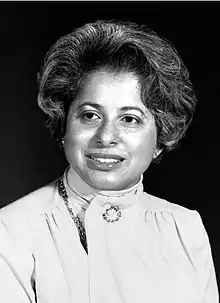Patricia Roberts Harris
Patricia Roberts Harris (May 31, 1924 – March 23, 1985) was an American government official and diplomat who served under President Jimmy Carter as United States Secretary of Housing and Urban Development, and United States Secretary of Health, Education, and Welfare (which was renamed the Secretary of Health and Human Services during her tenure). She was the first African American woman to serve in the United States Cabinet, and the first to enter the line of succession to the Presidency. She previously served as United States Ambassador to Luxembourg under President Lyndon B. Johnson, and was the first African-American woman to represent the United States as an ambassador.[1]
Patricia Roberts Harris | |
|---|---|
 | |
| 14th United States Secretary of Health and Human Services | |
| In office May 4, 1980 – January 20, 1981 | |
| President | Jimmy Carter |
| Preceded by | Herself (Health, Education, and Welfare) |
| Succeeded by | Richard Schweiker |
| 13th United States Secretary of Health, Education, and Welfare | |
| In office August 3, 1979 – May 4, 1980 | |
| President | Jimmy Carter |
| Preceded by | Joseph A. Califano Jr. |
| Succeeded by | Herself (Health and Human Services) Shirley Hufstedler (Education) |
| 6th United States Secretary of Housing and Urban Development | |
| In office January 23, 1977 – September 10, 1979 | |
| President | Jimmy Carter |
| Preceded by | Carla Anderson Hills |
| Succeeded by | Moon Landrieu |
| United States Ambassador to Luxembourg | |
| In office September 7, 1965 – September 22, 1967 | |
| President | Lyndon B. Johnson |
| Preceded by | William R. Rivkin |
| Succeeded by | George J. Feldman |
| Personal details | |
| Born | Patricia Roberts May 31, 1924 Mattoon, Illinois, U.S. |
| Died | March 23, 1985 (aged 60) Washington, D.C., U.S. |
| Political party | Democratic |
| Spouse(s) | William Harris (m. 1955–1984) |
| Education | Howard University (BA) University of Chicago American University (MS) George Washington University (JD) |
Early life
Roberts was born on May 31, 1924, in Mattoon, Illinois,[2] the daughter of railroad dining car waiter Bert Fitzgerald Roberts and Hildren Brodie (née Johnson). Patricia had one younger brother, Malcolm, known to his family as Mickey.[3] Her parents separated when she was 6 years old.[3] She was then raised primarily by her mother and grandmother.[3]
She graduated summa cum laude from Howard University in 1945.[4] While at Howard, she was elected Phi Beta Kappa and served as Vice Chairman of the Howard University chapter of the NAACP.[5] In 1943, she participated in one of the nation's first lunch counter sit-ins.[6][3] She did postgraduate work in industrial relations at the University of Chicago from 1946 to 1949 and at American University in 1949.[7]
She worked as the Assistant Director of the American Council on Human Rights until 1953. There she met William Beasley Harris, a member of the Howard law faculty; they were married on September 1, 1955. She was the first national executive director of Delta Sigma Theta sorority, of which she was a member.[8] Roberts' was beginning to pursue a career in education, but saw limited opportunity because of segregation.[3] Her husband encouraged her to go to law school.[3] Roberts received her J.D. from the George Washington University National Law Center in 1960, ranking number one out of a class of ninety-four students.[6]
Career
Harris worked briefly for the U.S. Department of Justice[3] Her first position with the U.S. government was in 1960 as an attorney in the appeals and research section of the criminal division of the Department of Justice. There she met and struck up a friendship with Robert F. Kennedy, the new attorney general. In 1963, President John F. Kennedy appointed her co-chairman of the National Women's Committee for Civil Rights.
In 1961, Harris returned to her alma mater, Howard University, as an associate dean of students and law lecturer at Howard's law school. In 1963 she was elevated to a full professorship.
In 1964, Harris was elected a delegate to the Democratic National Convention from the District of Columbia. She worked in Lyndon Johnson's presidential campaign and seconded his nomination at the 1964 Democratic Convention. Soon after his victory, President Johnson appointed her Ambassador to Luxembourg from 1965 to 1967. She was the first African American woman named as an American envoy. She said, "I feel deeply proud and grateful this President chose me to knock down this barrier, but also a little sad about being the 'first Negro woman' because it implies we were not considered before."[9]
She was named Dean of Howard University's School of Law in 1969, which was another first for a black woman.[10] She resigned a month later as Dean of Howard University's School of Law when Howard University President James E. Cheek refused to support her strong stand against student protests.[11] Following her service as Dean of Howard's School of Law, she joined Fried, Frank, Harris, Shriver & Jacobson, one of Washington, D.C.'s most prestigious law firms.

In 1971, Harris was named to the board of directors of IBM. In addition, she served on the boards of Scott Paper Co. and Chase Manhattan Bank.[12]
She continued making an impact on the Democratic Party when, in 1972, she was appointed chairman of the credentials committee[6] and a member-at-large of the Democratic National Committee in 1973. A testimony to her effectiveness and her commitment to excellence came when President Jimmy Carter appointed her to two cabinet-level posts during his administration.
Cabinet Secretary
Harris was appointed to the cabinet of President Jimmy Carter when he took office in 1977. At her confirmation hearing, Senator William Proxmire questioned whether Harris came from a background of too much wealth and power to be an effective Secretary of Housing and Urban Development. Harris responded "I am a black woman, the daughter of a Pullman (railroad) car waiter. I am a black woman who even eight years ago could not buy a house in parts of the District of Columbia. I didn't start out as a member of a prestigious law firm, but as a woman who needed a scholarship to go to school. If you think I have forgotten that, you are wrong."[13] Once confirmed, Harris became the first African American woman to enter the Presidential line of succession, at number 13. Between 1977 and 1979 she served as Secretary of Housing and Urban Development (HUD),[4] and in 1979, she became Secretary of Health, Education, and Welfare, the largest Cabinet agency.[13]

After the Department of Education Organization Act came into force on May 4, 1980, the educations functions of the Department of Health, Education and Welfare were transferred to the Department of Education. Harris remained as Secretary of the renamed Department of Health and Human Services until Carter left office in 1981. Because the department had merely changed names, as opposed to disbanding with new department being created, she did not face Senate confirmation again after the change.
Post-government
Harris unsuccessfully ran for Mayor of Washington, D.C. in 1982, losing the September 14 primary election to incumbent mayor Marion Barry .That year, she was appointed a full-time professor at the George Washington National Law Center.[6]
Personal life and death
In 1967, Lord Snowdon photographed Harris for Vogue at the United Nations.[3] In her spare time, Harris enjoyed cooking and baking.[3]
Patricia married William Beasley Harris in 1955 after only three months of dating.[3] Her husband William died in November 1984.[6] She died of breast cancer at age 60 on March 23, 1985.[6] She was interred at the Rock Creek Cemetery in Washington, D.C.
Patricia Roberts Harris served as Delta Sigma Theta Sorority, Inc.'s first Executive Director. In January 2000, she was honored on the 23rd commemorative stamp in the United States Postal Service's Black Heritage Series. Additionally, In 2003, Harris was inducted into the National Women's Hall of Fame.[14]
See also
Further reading
- Plowden, Martha Ward (2002). Famous firsts of Black women (2nd ed.). Gretna, La.: Pelican Pub. Co. ISBN 1565541979. OCLC 47650434.
- Hightower-Langston, Donna (2002). A to Z of American women leaders and activists. New York: Facts on File. ISBN 0816044686.
- Baldwin, Louis (1996). Women of strength: biographies of 106 who have excelled in traditionally male fields, A.D. 61 to the present. Jefferson, NC [u.a.]: McFarland. ISBN 0786402504.
References
- DeLaat, Jacqueline (2000). "Harris, Patricia Roberts". Women in World History, Vol. 7: Harr-I. Waterford, CT: Yorkin Publications. pp. 14–17. ISBN 0-7876-4066-2.
- Thompson, Kathleen (1994). "Harris, Patricia Roberts (1924–1985)". Black Women in America: An Historical Encyclopedia. Bloomington: Indiana University Press. pp. 539–540. ISBN 0-253-32774-1.
- Pianin, Eric (September 7, 1982). "Patricia Harris: A Life of Striving To Be a Champion". The Washington Post. ISSN 0190-8286. Retrieved February 2, 2018.
- Bracks, Lean'tin (2012). African American Almanac: 400 Years of Triumph, Courage and Excellence. Detroit, Michigan: Visible Ink Press. pp. 75. ISBN 9781578593231.
- Taylor, Erica; Show, The Tom Joyner Morning. "Little Known Black History Fact: Patricia Roberts Harris". Black America Web. Retrieved March 31, 2016.
- Boyd, Gerald M. (March 24, 1985). "Patricia R. Harris, Carter Aide, Dies". The New York Times. ISSN 0362-4331. Retrieved February 2, 2018.
- American Women Managers and Administrators
- Notable Deltas Archived October 13, 2012, at the Wayback Machine
- "Patricia Roberts Harris". diplomacy.state.gov. Archived from the original on July 28, 2016. Retrieved March 31, 2016.
- "Patricia Roberts Harris Facts, information, pictures | Encyclopedia.com articles about Patricia Roberts Harris". www.encyclopedia.com. Retrieved March 31, 2016.
- "Harris, Patricia Roberts (1924-1985) | The Black Past: Remembered and Reclaimed". www.blackpast.org. Retrieved March 31, 2016.
- "Biography.com". Archived from the original on September 12, 2017. Retrieved May 18, 2019.
- "Patricia Roberts Harris Dies of Cancer". Los Angeles Times. Associated Press. March 24, 1985. ISSN 0458-3035. Retrieved February 19, 2017.
- National Women's Hall of Fame, Patricia Roberts Harris
External links
- "African-American Almanac, "Biography: Patricia Roberts Harris"". Archived from the original on January 28, 1999. Retrieved September 2, 2004.
- Patricia Roberts Harris at Find a Grave
- A&E Biography
- National Women's Hall of Fame biodata for Patricia Roberts Harris
- Patricia Roberts Harris biodata
- The short film STAFF FILM REPORT 66-28A (1966) is available for free download at the Internet Archive
- Patricia Roberts Harris Archival Collection Finding Aid Moorland Spingarn Research Center
- Old D.C. Council Campaign Posters - Ghosts of DC blog
| Diplomatic posts | ||
|---|---|---|
| Preceded by William Rivkin |
United States Ambassador to Luxembourg 1965–1967 |
Succeeded by George Feldman |
| Political offices | ||
| Preceded by Carla Hills |
United States Secretary of Housing and Urban Development 1977–1979 |
Succeeded by Moon Landrieu |
| Preceded by Joseph Califano |
United States Secretary of Health, Education, and Welfare 1979–1980 |
Succeeded by Herself as United States Secretary of Health and Human Services |
| Succeeded by Shirley Hufstedler as United States Secretary of Education | ||
| Preceded by Herself as United States Secretary of Health and Human Services |
United States Secretary of Health and Human Services 1980–1981 |
Succeeded by Richard Schweiker |

